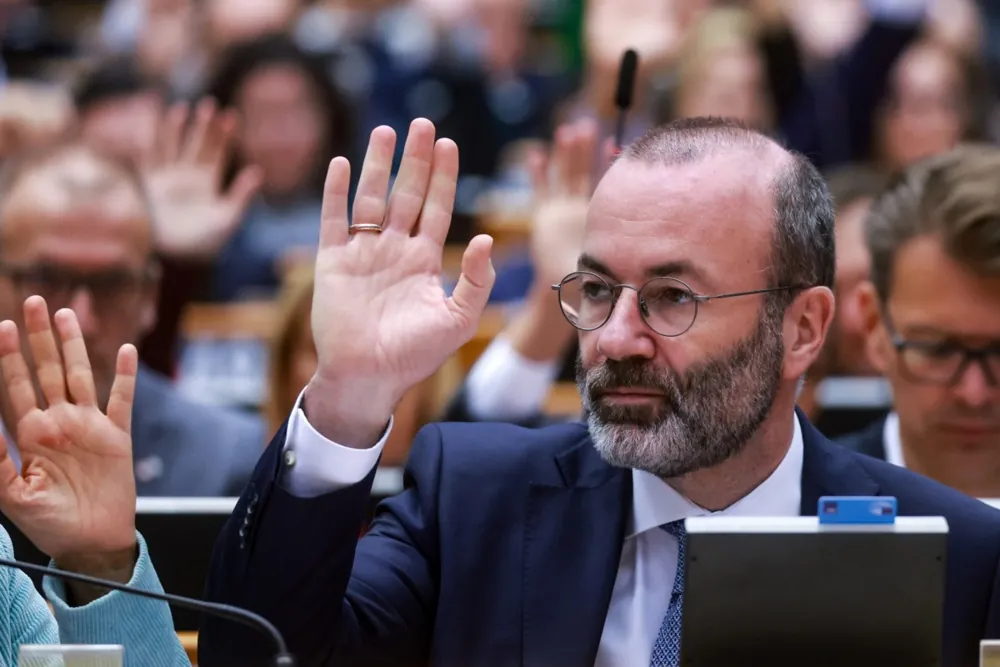The European People’s Party (EPP) – the largest and oldest political group in the European Parliament, the Progressive Alliance of Socialists and Democrats (S&D) and the Renew Europe group have entered into a “coalition agreement” to work together. As long-time correspondent of the Delo newspaper, Peter Žerjavič pointed out, the common platform of the EPP, S&D and Renew “coalition” in the European Parliament is general and non-binding, which will make it easy for the EPP to work with parties on the right, too.
We have already written that the current situation in the European Parliament is different than in the previous convocation. The EPP has “an alternative right-wing majority at its disposal if it cannot get its way in the unofficial pro-European “coalition”.” According to journalist Peter Žerjavič, the EPP has already used this option several times. “This is why the friction in the EPP, S&D and Renew alliance is growing”, he warned last week.
One of the recent votes, however, illustrated that things are moving in the right direction for the centre-right. Namely, Members of the European Parliament voted in favour of postponing the implementation of last year’s European Union deforestation regulation, and adopted several amendments along the way. In addition to the European People’s Party, other right-wing parties (the European Conservatives and Reformists – ECR and the Patriots for Europe), as well as a section of the Liberals, voted against implementation. Commenting on the outcome of the vote, Slovenian MEP Romana Tomc said she was pleased that “this year’s European elections have turned Europe slightly to the right.” “This is, of course, a thorn in the side of the socialists and the left. However, the people have shown what kind of Europe they really want,” she added.
The EPP will be able to pursue its objectives easily in alliance with the right
In the case of the recently launched joint platform of the EPP, S&D and Renew “coalition” in the European Parliament, Žerjavič pointed out that it is general and non-binding. “It is a far cry from the coalition agreements in individual member states. The EPP will be able to pursue its objectives from time to time in alliance with the right without any problems.”
However, according to the media outlet Euronews, the recently adopted coalition agreement will allow the new European Commission to take office on the 1st of December. On Wednesday, the six vice-presidents of the European Commission were agreed on, and the green light was given to the appointment of Hungary’s most controversial candidate for European Commissioner, Olivér Várhelyi. The Vice-Presidencies of the European Commission will be held by Raffaele Fitto of the European Conservatives and Reformists, Henna Virkkunen of the European People’s Party, Teresa Ribera and Roxana Minzatu of the Socialists and Democrats, and Kaja Kallas and Stephane Sejourne of the Renew group.
The text, entitled “Platform Cooperation Statement” (available here: https://www.politico.eu/wp-content/uploads/2024/11/20/FINAL_PLATFORM_STATEMENT-updated.pdf) sets out nine points reflecting the political guidelines published by European Commission President Ursula von der Leyen on the 18th of July 2024, the day of her re-election. “The rule of law, a pro-Ukraine stance and a pro-European approach are core aspects of our cooperation,” reads the first point, entitled “Uniting Europe: leading Europe based on shared values”. The other points highlight sustainable growth, competitiveness, the digital transition, migration and defence policy, the European social model, food security, water and a sustainable environment, strengthening the rule of law, the European Union’s role as a world leader, the EU budget and the reform of the European Union.
“It is crucial for the EPP that the European Commission starts work on the 1st of December. Europe needs stability,” said the EPP leader, Manfred Weber, who believes they have managed to reach a balanced agreement. He said the EPP, Socialist and Liberal political families will play an important role in the future European Commission, and Italy must also play a leading role. The ECR party is led by Italian Prime Minister Giorgia Meloni. The S&D and Renew political groups also expressed their satisfaction with the “coalition deal”.
However, not everyone is happy with the outcome. The party of the European Left has been particularly critical of the above. They consider the case to be a “backroom deal,” and believe that there has been a clear violation of procedure. They are not at all happy that in November, it was agreed that the vice-presidents would be confirmed as a “package” and not individually. “This is not a new majority; it is an old majority. This alliance between the EPP and the S&D is unsustainable and will destroy Europe,” Spanish MEP Hermann Tertsch told Euronews.
Members of the European Parliament will vote on the new convocation on the 27th of November in Strasbourg, which will also mark the end of the long process of appointing the European Commission, which will once again be led by Ursula von der Leyen. As Žerjavič pointed out, the entire European Commission can count on the support of Giorgia Meloni’s ECR.
A. H.


